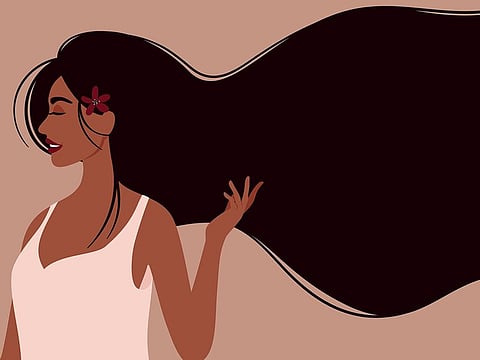Does rice water haircare transform you into Rapunzel?
Experts weigh in on the evidence surrounding the practice

Well, singer-rapper Cardi-B says so. Last year, she decided to use rice water on her hair. Many hadn’t even heard of this unusual routine. In the video, she detailed her process. First, detangle your wet hair. Secondly, prepare your mask. That entails avocado, two eggs, and mayonnaise. Pour castor oil. You’ve got a mixture. Now apply it to your hair. Then, wash your hair with rice water.
Cardi-B was emphatic in her caption for the Instagram video. “You’ve seen my hair since 2014. It didn’t grow past my shoulder. With discipline it’s like this today.” At the end of the clip, Cardi-B flaunts her glowing black hair, as she sends kisses to the camera.
This wasn’t a recent brainwave.
Before, Cardi-B, TikTok and beauty influencers, Japanese women did it first. The court ladies in Japan of the Heian period (794-1185 AD) had beautiful long hair, according to research published in the international Journal of Cosmetic Science in 2010. The women would use ‘Yu-Su-Ru’, which was rinse water obtained from the washing of rice.
This method was later popularised by a village in China called Huangluo. As a result, the current-day Yao Women, the residents of the village, are known for their hair, which is around six feet long, as per UK-based website Medical News Today. The women credit strong strands and the dark hair to washing it with rice water.
The effectiveness of rice water is rather restricted to tradition and history. However, people have reasons as to why they vouch for it.
‘A game-changer’
“Rice water is the starchy liquid that is left after soaking or boiling rice,” says Tara Rose Kidd, the Founder of Tara Rose Salons, a beauty salon based in Abu Dhabi. Rice water contains a carbohydrate called inositol, which can repair damaged hair and make it stronger, she adds. There are claims that it helps to promote hair growth by improving blood circulation to the scalp. Moreover, the starchy solution is said to help get that shine too.
Rice water contains amino acids that can support hair regeneration, says Rose. However, there is little scientific evidence to support these claims.
She warns against using it too often, as it has a tendency to damage hair by making it dry and brittle. “Consult your dermatologist or a haircare specialist before you apply it to your hair,” she advises.
Rice water is also filled with vitamins C, D and E. This is expected to strengthen the hair roots, explains Alefiyah Johar, a professional make-up artist and managing director of FC beauty and Missha Middle East, a beauty brand.
For Johar, rice water in both her skincare and haircare have been nothing less than a “game-changer”. “I have been using rice water once a week on my hair for months now. I love the difference it has made. It made my hair stronger and shinier. It reduced dandruff, along with itching,” says Johar. She adds that it also helps in controlling the frizziness of her hair.
Rice water hydrates and moisturises skin, explains Johar. “The amino acids found in rice water help to lock in moisture, keeping skin hydrated and plump.” This is especially important for those with dry or dehydrated skin, as it can help to alleviate flakiness and tightness, she further adds.
Is it a myth?
Rice water might have several benefits, but it still might not get us those dazzling hair length. There’s s no hard scientific evidence to support the claims.
“Japanese women have been doing it for centuries, but now It’s the new trend. The next thing that goes around is caffeine. Now it’s rice water. There’s no proof,” says Michael Ryan, a trichologist at the Dubai-based clinic Wellth.
People insist that it makes their hair richer and shinier owing to the starch present in the water. However, Ryan says that the claims stem from purely anecdotal evidence. “The molecules and the protein can’t really penetrate the hair shaft. It can make the hair sticky and smell, too. It probably makes the hair feel thicker, but there is absolutely no evidence that it makes your hair grow. It’s a Japanese myth,” adds Ryan.
He calls it a tradition that it has been passed down in generations in Japan. “The hair industry is a billion dollar one, and people are always looking for something new to use,” he adds.
I would take these claims about rice water with a grain of salt, says Ali Halawi, a Dubai-based cosmetic dermatologist. Rice water is indeed rich in some vitamins such as B, E and minerals including magnesium, zinc, among others. However, the hair root which usually absorbs nutrients from the bloodstream is in the hair follicle. “This is embedded deep in the skin, making it quite difficult for topically applied nutrients to reach,” he elaborates. He goes on to say that the hair shaft we see is in fact, made of dead, keratinised cells. Keratin is the protein synthesised by the skin cells. It contributes to barrier formation in the skin and its appendages, he adds.
The hair root which usually absorbs nutrients from the bloodstream is in the hair follicle. This is embedded deep in the skin, making it quite difficult for topically applied nutrients to reach.

“Some claims allude to the porosity of hair and its implication on the effectiveness of rice water in improving hair health,” he adds. While genetic factors may affect the porosity of hair, high porosity is often a sign of damaged hair. “On one hand, high porosity means that hair may better absorb moisture; however, it also means it fails to retain it,” concludes Halawi. He complements Ryan’s point that there is no conclusive scientific evidence for or against the use of rice water.




